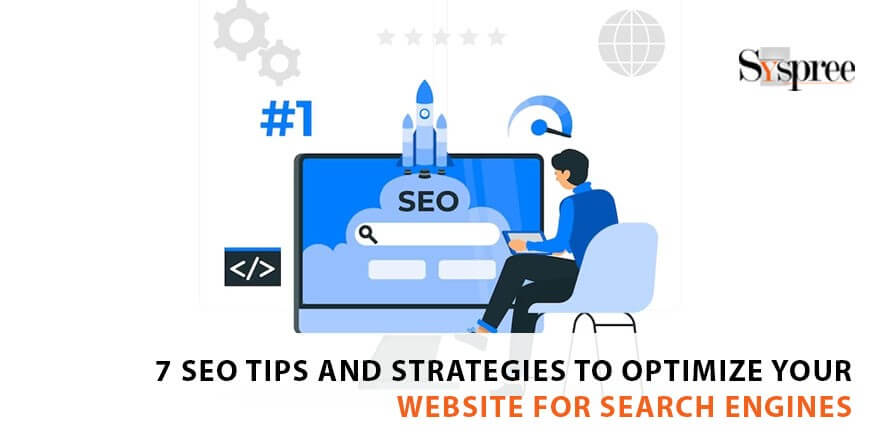Welcome to our blog, where we’ll reveal several of the best and most efficient SEO strategies and tips to optimize your site to be indexed by search engines. With the ever-changing digital landscape, it’s more crucial than ever to stay ahead of the competition and ensure your website appears high on search results.
A top digital marketing company states that if you’re running an e-commerce website or blog site, optimizing your site to be SEO-friendly can result in more traffic, improve the number of conversions and eventually increase your profits.
In this article, we’ll provide eight SEO tips and strategies that will increase the visibility of your website and increase organic visitors on search engines. Let’s start and find out how to elevate your website to the top tier using these effective SEO techniques!
Key Takeaways
- Conducting thorough keyword research is vital to the success of SEO.
- Optimizing the web page is a crucial element of SEO that can greatly impact the rankings of websites.
- Creating high-quality, relevant, interesting content is vital to increase the ranking of your website.
- A regular update to website content could boost search engine rankings.
- Link building is a crucial strategy to boost website rankings and organic traffic.
8 SEO Strategies and Tips to Optimize Your Site for Search Engines
Nowadays, web-based sites are crucial for any business that wants to be successful online. But having an online presence isn’t enough. You must optimize it for search engines to ensure that it is highly ranked in the results of a search.
In this blog article, we’ll share eight SEO strategies and tips you can employ to improve your site’s performance for search engines and draw in more organic visitors.
1. Keyword Research: The Foundation of Successful SEO Strategy

Keyword Research – The Foundation of Successful SEO Strategy
If you’re seeking to increase the search engine ranking of your website, one of the most crucial things to do is to conduct extensive keyword research. Keyword analysis involves analyzing and identifying the keywords users use to search for information on the internet. If you know which keywords your market is using, you can improve your site’s content to show up in the relevant search results.
Steps to Conduct Keyword Research
- The first step to conducting keyword research is establishing your objectives. What are you hoping to accomplish with this SEO strategy? Do you want to attract more people to your website and increase sales or your brand’s visibility? Determining your goals will allow you to determine which keywords are the most relevant for your company.
- After establishing your objectives, you’ll need to create possible keywords. You should think about the keywords and phrases your target audience will likely type in when looking for information relevant to your company. Additionally, you can use tools such as the Google Keyword Planner to generate keyword ideas based on your company’s offerings or services.
- Once you have created a list of possible keywords, it’s now time to examine the metrics of each. Examine metrics such as traffic volume, competition, and relevancy to determine the keywords most relevant to your company and have the greatest potential to bring traffic to your website.
2. On-Page Optimization
On-page optimization is optimizing different elements of your website to make it user-friendly for search engines. This includes the content you put on your website, the HTML code that runs behind them, and how you structure your site.
Let the best SEO company in optimizing your On-Page. On-page optimization is an essential element of SEO that can greatly impact your website’s ranking on search engines.
Tips for Optimizing On-Page Elements
- Title Tags: Title tags are HTML tags that determine the name of your website. They are shown on search engine result webpages (SERPs) and may dramatically impact your website’s conversion rate. To make your title tags more effective, ensure they’re informative, have relevant keywords, and are no more than 60 characters.
- Meta Descriptions: Meta descriptions provide an overview of the contents of your website and appear on search engine results below the headline tag. They could affect your site’s effectiveness in attracting clicks, and optimizing them is vital. To optimize your meta description, ensure they’re specific, contain relevant keywords, and have less than 155 characters.
- Header Tags: Header tags (H1, H2, H3, etc.) are HTML tags that determine the headings of your website. They can help you organize your information and help search engines index and crawl your site. To make your header tags more effective, ensure that you utilize them to organize your content logically and use relevant keywords. You should also use just one tag for each page.
- Content Optimization: Content that appears on your website pages is essential to optimizing your site’s performance on the page. In order to optimize the content on your site, be sure that it’s relevant, informative, and contains relevant keywords. Use subheadings, bullet points, and images to divide your content, making it more enjoyable to understand.
- URL Optimization: URLs form a crucial to on-page optimization. For optimal URLs, be sure they’re descriptive and include relevant keywords, and do not exceed the length of 255 characters.
3. Content Creation: The Key to Successful SEO
To improve the search engine ranking of your site, creating content is crucial. Relevant, high-quality, and engaging content will aid your site in ranking more highly in results and generate more visitors. Allow the most creative content marketing company in India to create amazing interactive content so that you can get the benefits of content marketing.
Search engines such as Google employ sophisticated algorithms to decide the websites displayed in their search results. One of the main elements these algorithms consider is the quality and credibility of the website’s content.
Tips for Creating SEO-Friendly Content
- Incorporating appropriate keywords and terms within your content can assist search engines in comprehending the content and make it more prominent in results from searches.
- Headings are essential to organize your content and make reading easier for readers.
- Writing simple content to read and comprehend is crucial for your readers and search engines. Use short paragraphs, subheadings, bullet points, and other formatting methods to make your content more readable and easier to read.
- Making interesting content that offers value to your visitors is crucial for SEO. If your content is engaging, readers tend to stay on your website and even share the content with others. This will increase your site’s credibility and allow it to get higher rankings in search results.
4. Link Building

Search engines use backlinks to indicate a site’s importance and authority
The best SEO company in Singapore believes that link development is getting hyperlinks on other sites to your website. They are also called “backlinks” and are essential to SEO. Search engines use backlinks to indicate a site’s importance and authority. The more relevant, high-quality backlinks a site has, the more likely it will be to be ranked highly within search result pages.
Tips for Building High-Quality, Relevant Links
- Developing quality content is the first step in creating high-quality, relevant backlinks. High-quality content that adds value to your customers will be more likely to get backlinks from other websites.
- Reach out to relevant websites within your field and offer to create information or offer the audience value. This will help to establish an association and increase the chances of getting backlinks from these sites.
- Guest blogging is writing an article and its publication on a different website. By hosting guest blogs at relevant sites, you will establish yourself as an authority in your field and get website backlinks.
- Social media is an effective link tool. When you share your content on social media sites, and gain more visitors and increase the chance of getting backlinks, also known as social bookmarking.
- Building broken links involves locating damaged links from other sites and then providing the broken links with relevant content from your site. This will help build connections with other website owners and attract quality backlinks for your site.
5. Mobile Optimization: Why it’s Crucial for SEO Success
Mobile optimization is ensuring your site is designed for use on mobile platforms, such as tablets and smartphones. This means that you must ensure that your site is simple to navigate and use on smaller screens, responsive, loads quickly, and optimized to interact with touch. Get the help of a leading digital marketing company to create your mobile-friendly website.
Tips for Optimizing Your Website for Mobile Devices
- Responsive web design refers to a web design adapted to the screen size on which it’s displayed. Your site is beautiful and easy to access on any device, from desktop computers to smartphones.
- High-resolution and large images may slow your website’s performance on mobile devices. This can affect your search engine rankings. Ensure your photos are optimized by compression and using the correct format for your images.
- When you have smaller screens, navigation menus can be difficult. Improve your website navigation with dropdown menus and collapsible menus.
- Text with a small font size could make it difficult for users to comprehend on mobile devices. Utilize large font sizes so your content is simple to read on smaller screens.
6. Technical SEO: Optimizing Your Website for Search Engines
Technical SEO encompasses a variety of technical factors that may affect your site’s search engine results. This includes site speed as well as site architecture crawlability, site architecture, and many more. The best SEO company states that technical SEO is the process of improving these elements to increase your site’s rankings on search engines.
Tips for Optimizing Technical Elements
- The website speed of your site is a crucial ranking factor. Enhance the speed of your site by optimizing your images, reducing the amount of HTTP requests, and decreasing the use of scripts and plugins.
- A clear website structure makes navigating and comprehending your site easier for search engines. Ensure you have an organized hierarchy of subcategories and categories and utilize internal linking to help search engines comprehend the connection between the pages.
- The term “crawlability” refers to the capacity of search engines to index and crawl your site. Make sure your site can be crawled by creating an XML sitemap, improving your robots.txt file, and fixing broken links.
7. Analytics and Tracking
Analytics and tracking are vital for SEO
Analytics and tracking are vital for SEO because they assist in evaluating the effectiveness of a site’s SEO efforts. Through tracking important metrics like natural traffic, bounce rate, and conversion rates, website owners can pinpoint areas of improvement and alter their SEO strategy to meet the needs of their customers. Let a brilliant content marketing company in India guide you in measuring the effectiveness of SEO efforts and help justify the expenditure in SEO.
Tips for setting up and using Analytics Tools, such as Google Analytics
- The first step to using analytics tools is setting up an application like Google Analytics. This involves placing the tracking code on your site and configuring the tool to monitor relevant metrics.
- Goals are essential to measuring SEO efforts’ effectiveness. When you establish specific, measurable objectives, you can monitor your progress and decide based on data.
- The most important metrics, like organic bounce rate, traffic, and conversion rate, must be regularly monitored. If you track these indicators as they change, you can detect trends and modify your SEO strategy accordingly.
- By creating custom reports, you can keep track of particular metrics and gain more insight into how users interact with your site.
- A/B testing involves testing two different website versions to see which performs better. By performing A/B tests, optimizing your site for greater performance and increasing your SEO rankings is possible.
Effective Backlinking Strategies to Boost Your Website’s SEO

Backlinking Strategies to Boost Your Website’s SEO
Backlinking is a crucial element of any effective SEO strategy. Backlinks are links that link other websites to your website and are an important factor in determining your website’s authority and relevancy for search engine crawlers.
There are various ways to get high-quality backlinks, such as guest blogging, broken link building, or influencer marketing. It is crucial to build relevant and natural backlinks that will add value to your website and make it an authority in your field.
The best SEO company in Singapore recommends that if you can develop a robust backlinking plan, you can increase your website’s SEO up a notch and enjoy lasting, long-term success on the internet.
Conclusion:
In the end, following these SEO tips and strategies will help you to optimize your website to be indexed by search engines. Boost your rank, and increase organic visitors to your website. Begin optimizing your site now! If you enjoyed reading this article, please look at our previous blog post on the Surprising Impact of Website Speed on User Experience and SEO.








I am really inspired along with your writing abilities as well as with the structure to your blog. Is that this a paid topic or did you customize it yourself? Anyway stay up the excellent quality writing, it is uncommon to look a nice weblog like this one nowadays..
Thank you so much for your kind words and praise